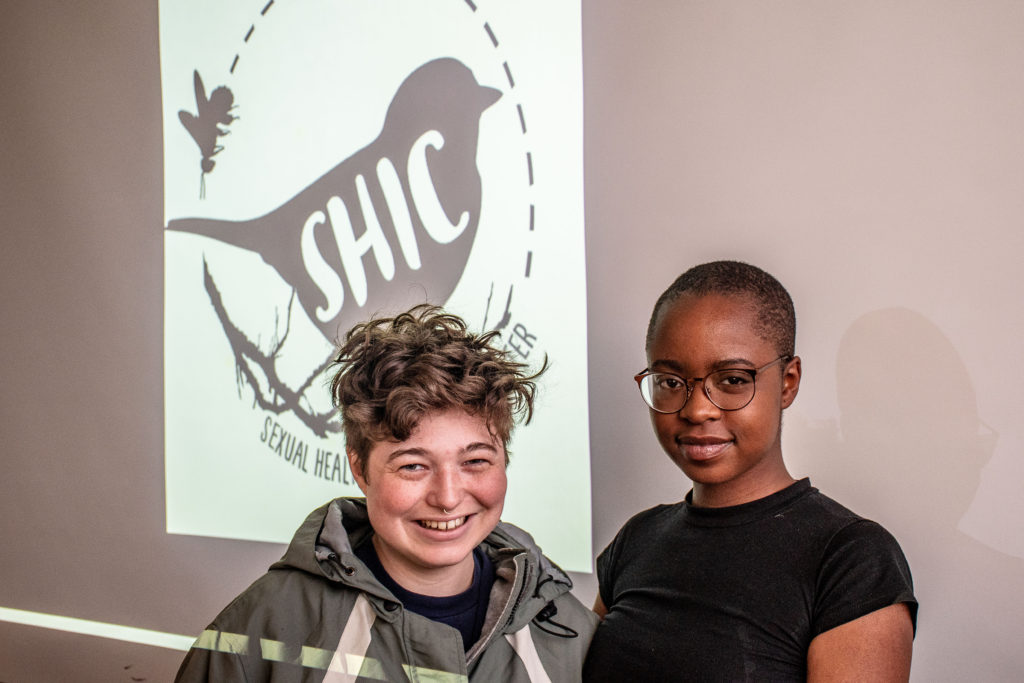On Friday, Jan. 24, Student Affairs announced in an all-campus email that they were putting the Grinnell College Sexual Health Information Center’s (SHIC) operations on hold, citing employees’ lack of training and supervision, students’ role as representatives of the College and their school-sourced funding source. Now, as of Wednesday, Jan. 29, Student Affairs stated via all-campus email that SHIC would return to normal hours but in a limited capacity.
SHIC currently can only offer condoms, dental dams, lubricant and menstrual products — far fewer items than one would normally see on their shelves in Main Hall. They are not permitted to distribute gender affirming products and consumer sex toy products. Additionally, the SHIC staff are not allowed to conduct programming or peer education sessions unless they partner with an administrator.
Zama Buthelezi ’21 and Anna Bell Hines ’20, the SHIC administrators, have been in conversation with administrators to work towards bringing SHIC back to its former capacity since the Jan. 24 announcement.
“One of the main concerns [we have] is whether or not we’ll still be able to [provide] toys,” said Buthelezi. The administration directed SHIC to cease their distribution of consumer products, citing the medical liability of having these products in the store and having students distribute said products.
“Anything in terms of specifics of what those liabilities are and ways that we can be excused of those liabilities hasn’t really been discussed with us,” said Buthelezi.
For the past two weeks, Buthelezi and Hines have been questioning and pushing for answers. “We don’t really know the specifics of what would be required for us to keep selling toys, we’re not being told those things. We’re just being told it’s not a possibility because of ‘x, y and z’ and all these vague reasons,” she said.
Ben Newhouse, dean of students, felt that pausing SHIC was the best way to ensure the center would return and be able to provide key services for the student body.
“We needed to press pause and to really ascertain the path forward for SHIC,” said Newhouse in an interview with The S&B.
“I want to emphasize pause. A pause to the current operations so that we could determine, in partnership with SHIC leadership, what are the operations that can return, to develop that timeline and to really, and more deeply, ensure that there is a clear training mechanism for the peer educators that work in SHIC.”
As SHIC is no longer able to provide gender affirming products, the Stonewall Resource Center (SRC) has offered to provide these items for students in need. Deka Spears, program coordinator for the Stonewall Resource Center, has been allocated funding to supply students with binders, tucking tape and gaffs.
Buthelezi and Spears are not sure if the SRC will continue to provide gender affirming products in the future but are happy that this need is being met. “As of right now, the only service the SRC has picked up are the gender affirming products,” Spears wrote in an email to The S&B.
“I can’t speak on whether or not SHIC will pick this up again in the future, that’s not a decision that’s up to me, but I do want to continue this partnership with SHIC regardless.”
Another problem that Buthelezi and Hines are trying to solve is the issue of a staff advisor for the center. There is a SHIC advisory board, but there is no direct certified educator present.
“As a student-run organization, that was never something that I would have thought would be necessary, or if it was necessary, I would assume that the advisory board would then act as adults who oversee us, … but the advisory board wasn’t in contact with us,” said Buthelezi.
Buthelezi wishes that there was more communication and clarity between administration, the advisory board and SHIC.
“I wish we had more of a relationship who would then guide us and show us where we’re going wrong rather than just tell us ‘somewhere, somehow this went wrong,’” said Buthelezi.
Another goal that Buthelezi has is to obtain certifiable training for the staff, so they are able to provide programming. However, Buthelezi voiced concerns about how to structure the training, who would conduct the sessions and if administration would veto their suggested candidates.
“We were shut down because the administration felt like we weren’t well-trained, so I would have assumed that they would have come with ideas of here’s who can train you, [but they didn’t],” explained Buthelezi.
Buthelezi and Hines are determined to continue to fight for SHIC, its services and the students who rely on the center. SHIC plays an important role for students in terms of health and wellness.
“We have a lot of dreams for the center, but right now we’re just focused on getting it back, fully,” she said.



























































